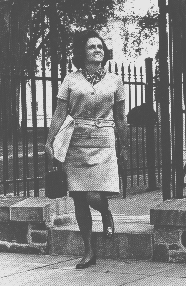Page 50
[Begin Tape 1, Side A]
Ritchie: Let's see. In our last session, Isabelle, we talked about your work at the Cincinnati Enquirer's Washington bureau and you told me about getting the job at the Washington Star. And you just mentioned that you wanted to add something about that.
Shelton: Well, what I don't think I mentioned before was that during the period when I first came to Washington and went up and down the halls of the Press Building looking for work, as I told you, I also went to the daily newspapers. And I almost was hired by the Star at that point. The city editor, a man named Ed Tribble, wanted to hire me based on my five years' experience at the Chicago Sun. But he said, "I have to check with the managing editor who's out of town for a week. Come back in a week and we'll see."
Well, I went back in a week and he said, "Gee, I'm sorry. I can't hire you. The managing editor says we have enough women in the newsroom." They had three at the time. That would be illegal today. That's a prima facie case of sex discrimination but of course there weren't any such laws then.
But it says something about where women were in the profession then, I think. A lot of us, as I've said, were hired during the war. But once the war was over, the thinking went back to pretty much the way it had. Of course, it's all changed now. There are more women journalists today than men in this country. They haven't broken through the glass ceiling very much. They don't have the top management jobs. But they're all over the landscape covering things, including on radio and television. And I just love it every time I see them or hear them.
Ritchie: They're not confined to the women's pages.
Shelton: No, absolutely not. A few weeks ago, during the campaign, some program had a interview with the press spokesmen for the three campaigns, [Bill] Clinton, [George] Bush and [H. Ross] Perot. And I had been watching for a few minutes before it suddenly struck me: All three of them are women. And it didn't strike me as strange and it didn't seem to strike the station as strange. It was just the way things are. And I love it.
Ritchie: You mentioned last time that you followed Liz Carpenter's suggestion of looking into the job on the women's page because a friend of hers was leaving and the friend said it wasn't such a bad job.
Shelton: Yes. She said that they had just started to changeóshe had only been there about six months and then decided to get married. But when she had been hired, she like me had had broader experience but had been added to the society staff because they had decidedóI guess the managing editor and/or editor decided they had to reach out a little bit beyond the way they'd been coveringóthe way they covered society was very much like the way I told you it had been covered at the Cincinnati Enquirer. There were certain old-line familiesócave dwellers as they were called in Washington; I mentioned that beforeówho were what constituted Washington society.
Now, there was one additional and important element in Washington that Cincinnati did not have. In addition to the cave-dweller society, there was also what they called "official society," meaning the president and the senators and the cabinet members. And they did cover them. But they covered them basically at their social events, which still was pretty limiting.

